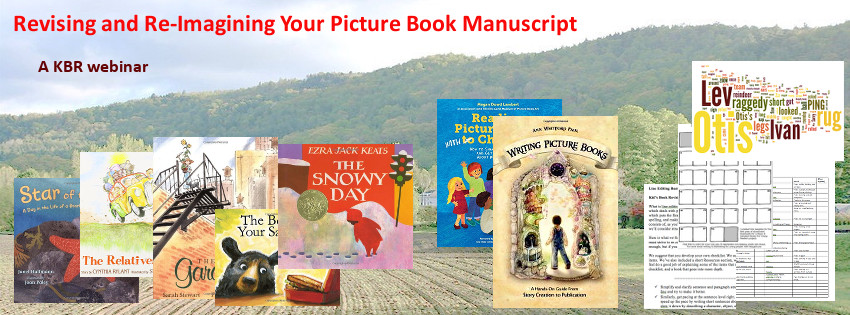
Revising and Re-Imagining Your Picture Book Manuscript: KBR Archives
This class was originally held in the spring of 2018 and is now part of the KBR Archives.
A free preview and introductory session, How Do Picture Books Work, exploring the idea of the reader as collaborator, is available for viewing.
To see what people have said about our past workshops, see our What Our Students Say page. If you have a question, please feel free to contact us.
Session 2 -- Getting Feedback from others: In this updated session we will cover how to get feedback from others in critique groups, from beta readers, and by working with children.
Session 3 -- Revising at the Big Picture Level to Get Your Story Working: In this session we will explore ways of seeing your story in a new light--the true meaning of "re-vision." We will try out techniques from the one-line summary to the story grid.
Session 4 -- Re-Imagining Character and Setting to Find a Fresh Approach: Sometimes there's nothing much wrong with a story, but it needs a fresh approach. It, or part of it, needs to be re-imagined. In this session we will look into methods to learn more about your main character and how to use different settings to tell a different story.
Session 5 -- Re-Imagining POV and Voice to Find a Fresh Approach: In this session we will continue to re-imagine, this time looking at point of view and voice, and find ways to transform how we are approaching them.
Session 6 -- Revising at the Word and Sentence Level to Polish Your Story: In this session, we will present and demonstrate self-editing methods that you can use to clean up your manuscript without hiring a copyeditor.
Frequently asked questions: If you have questions, you may find them answered on this page.
Harold Underdown and Eileen Robinson have worked together since 2008 to bring something different to aspiring authors. They have created online classes and tutorials and in-person workshops, presenting and working with writers at SCBWI conferences, recent workshops in western Massachusetts, Connecticut, and Pittsburgh, and an annual 4-day retreat at the Highlights Foundation. More information on their backgrounds.
Overview
Picture books are short and simple, written for young children, so they must be easy to write--or so we hear from people who have never attempted one. Picture book writers know that's not true, but their length does make it more practical to revise them, perhaps multiple times, and even to completely re-think or "re-imagine" them, than when working with longer forms.
Topics Covered
Some of what we cover in the class:
Session 1 -- Using Reader Response Theory to Understand Picture Books Work: In this session we will look at the two opposing approaches to understanding literature and explore how to use the least familiar of the two, reader response theory, to analyze your picture book.
In each session, we will provide a clear framework, examples from current and classic picture books ("touchstone" books), hands-on exercises, handouts and tools, recommended resources, and time for questions and discussion. Every session after the first one will open with examples from the "homework" from the previous week or from critiques (more on those below).